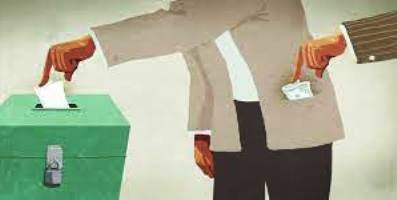By Femi Ogunshola
Vote buying is not a new lexicon in Nigeria electoral system. Desperate politicians allegedly deployed it to rig their way to victory and subvert the will of the people. As one Yoruba saying goes: “édíbó ésébé”, meaning `vote and cook good soup`.
The last primaries held by the leading political parties to choose their presidential flag bearers were allegedly characterised by vote buying.
“The way the buying is usually done, as we have observed, is that the voters will show the agents their vote for confirmation.
“They’ll pick a paper, and go to a preconceived location to get paid”, said Azuka Ogugua, Independent Corruption Practices and other related offences Commission (ICPC) spokesperson.
Ogugua said ICPC would partner Independent National Electoral Commission (INEC) to ensure that the challenge was addressed.
She told a media event organised by Premium Times ahead of the Osun governorship election that collaboration among security agencies was key to tackling the problem.
The Federal Ministry of Information and Culture has been waging a campaign against vote buying.
“Any voter whose choice of candidates in election is influenced by money, who eventually vote fraudulent people or mediocre into political offices, has ultimately sold out his or her future and that of his or her children.
“Nigerians should realize that vote buying is detrimental to the development of the country and do away with it”, the ministry said a publication on its verified website.
Similarly, Prof Attahiru Jega, the former chairman of the Independent National Electoral Commission (INEC) has also thrown his weight behind the campaign against vote buying.
“Nigeria political parties need to reorganise themselves and their primary responsibility, not only in promoting their interest, but also mobilising the citizens around national interests.
“Until and unless political parties begin to do that, we will continue to have very weak, if not epileptic democratic development and the will and aspirations of the people will not be satisfied.
With their money very bad and reckless politicians will capture the parties, capture the states, while we do nothing; that is not in the interest of this country”, he said.
Yabagi Sani, the National Chairman, Inter-Party Advisory Council (IPAC) urged politicians to stop using money to influence the rights of the people to choose their leaders.
Sani spoke at the Nigeria Institute of Policy and Strategic Studies (NPSS) during a forum for political parties on “Political Parties, Elections and the Consolidation of Democracy: Emerging Issues and the Needed Interventions in Nigeria.”
He also said that elections should not be characterised by rancour, noting that the conduct of free and fair elections in Africa has always been a very hard nut to crack.
“The power to choose is the fundamental rights of the people. The reason for electoral violence varies. It can be used to limit number of voters, to undermine the abilities of the opponents or to vandalize votes.
The European Union Ambassador to Nigeria and the ECOWAS, Samuela Isopi who also spoke at the event said there is a lot to be done to address the anomalies that have bedevil Nigeria election such vote buying and other forms of rigging.
The Director-General of NIPSS, Prof. Ayo Omotayo called for sustained efforts in ensuring credible elections in Nigeria.
Political parties according to him must desist from creating political violence and canvass for votes fairly, stressing the imperative of raising the standards of elections in the country.
Meanwhile, Prof. Mahmood Yakubu, INEC Chairman said the commission would continue to work towards reducing vote buying and other forms of electoral fraud to the barest minimum.
“The latest method employed in vote buying is alarming. Each time INEC takes steps to curb these electoral crisis politicians device more steps to subvert INEC’s efforts”, he said.
He said such unpatriotic practice erodes the integrity and sanctity of the elections.
Yakubu assured that as the nation’s electoral laws continues to evolve the challenges associated with conducting free and fair elections would be fixed one after another.
NANFeatures


